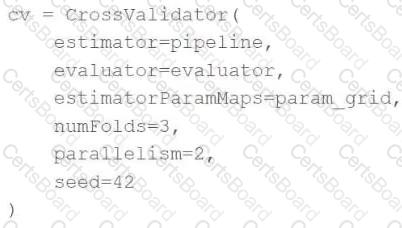What is the name of the method that transforms categorical features into a series of binary indicator feature variables?
A machine learning engineer is trying to scale a machine learning pipelinepipelinethat contains multiple feature engineering stages and a modeling stage. As part of the cross-validation process, they are using the following code block:

A colleague suggests that the code block can be changed to speed up the tuning process by passing the model object to theestimatorparameter and then placing the updated cv object as the final stage of thepipelinein place of the original model.
Which of the following is a negative consequence of the approach suggested by the colleague?
An organization is developing a feature repository and is electing to one-hot encode all categorical feature variables. A data scientist suggests that the categorical feature variables should not be one-hot encoded within the feature repository.
Which of the following explanations justifies this suggestion?
A data scientist wants to efficiently tune the hyperparameters of a scikit-learn model. They elect to use the Hyperopt library'sfminoperation to facilitate this process. Unfortunately, the final model is not very accurate. The data scientist suspects that there is an issue with theobjective_functionbeing passed as an argument tofmin.
They use the following code block to create theobjective_function:

Which of the following changes does the data scientist need to make to theirobjective_functionin order to produce a more accurate model?
A machine learning engineer is using the following code block to scale the inference of a single-node model on a Spark DataFrame with one million records:

Assuming the default Spark configuration is in place, which of the following is a benefit of using anIterator?
Which of the following is a benefit of using vectorized pandas UDFs instead of standard PySpark UDFs?
A machine learning engineer has created a Feature Table new_table using Feature Store Client fs. When creating the table, they specified a metadata description with key information about the Feature Table. They now want to retrieve that metadata programmatically.
Which of the following lines of code will return the metadata description?
A data scientist learned during their training to always use 5-fold cross-validation in their model development workflow. A colleague suggests that there are cases where a train-validation split could be preferred over k-fold cross-validation when k > 2.
Which of the following describes a potential benefit of using a train-validation split over k-fold cross-validation in this scenario?
Which of the following describes the relationship between native Spark DataFrames and pandas API on Spark DataFrames?
A health organization is developing a classification model to determine whether or not a patient currently has a specific type of infection. The organization's leaders want to maximize the number of positive cases identified by the model.
Which of the following classification metrics should be used to evaluate the model?


